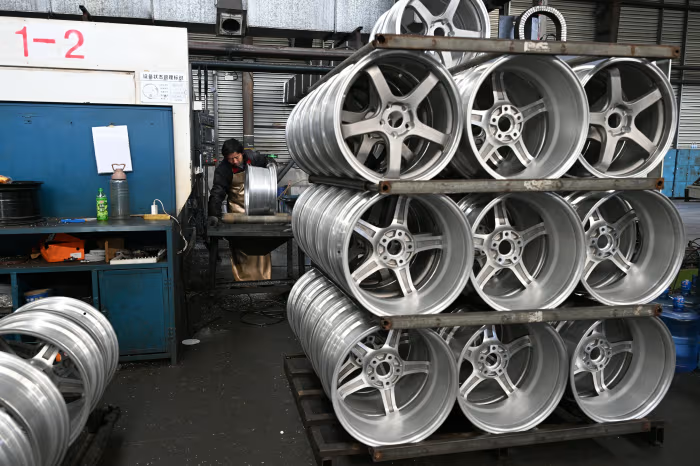Oaktree Capital Management, the Los Angeles-based investment firm known for distressed-debt turnarounds, is in advanced talks to take control of Superior Industries International Inc., the aluminum wheel manufacturer battered by U.S. and international auto parts tariffs, according to people familiar with the matter.
The talks mark a potential turning point for Superior (NYSE: SUP), one of the last major American-based suppliers of cast aluminum wheels to global automakers. The company, long plagued by rising raw material costs and trade headwinds, is reportedly nearing a restructuring deal that could see Oaktree convert its debt holdings into a controlling equity stake.
The negotiations are being led by Oaktree’s distressed-debt team and advised by powerhouse law firm Paul, Weiss, Rifkind, Wharton & Garrison LLP. According to sources, the transaction could be finalized as early as next month, pending board approvals and regulatory reviews.
Superior Industries has struggled since 2018, when the Trump administration imposed a 10% tariff on imported aluminum and broader levies on Chinese-made auto parts. The company, which sources raw materials globally and supplies General Motors, Stellantis, and BMW, saw its cost base surge amid rising trade barriers.
In its most recent earnings report, Superior posted a net loss of $58 million for 2024, down from a modest profit the prior year. Revenue slipped 6% year-over-year to $1.1 billion, as automakers shifted to lower-cost suppliers in Mexico and Asia.
Company executives have repeatedly warned that continued U.S. and EU tariffs on imported components—including aluminum billet, magnesium alloys, and precision dies—have “crippled the competitiveness” of North American suppliers.
“We’re at the mercy of geopolitical crossfire,” CEO Majdi Abulaban said on an earnings call in February. “Tariffs are squeezing margins, reducing OEM orders, and threatening our long-term viability.”
Superior’s stock has declined more than 72% in the past 12 months and currently trades below $1.25—a sign of growing investor concern about its solvency.
Oaktree, a leading creditor with over $180 billion in assets under management, began accumulating Superior debt in late 2023, purchasing discounted senior secured bonds and term loans. Insiders say Oaktree now holds over 60% of Superior’s outstanding debt, positioning it as the key player in any out-of-court restructuring or pre-packaged bankruptcy.
The firm is reportedly seeking to exchange its debt for equity, with a view to installing new management and streamlining Superior’s global operations. If a deal is reached, Oaktree could gain majority control without requiring a formal Chapter 11 filing—a path that may preserve customer contracts and vendor relationships.
“This is classic Oaktree,” said Joshua Cohen, an analyst at CreditSage Research. “They’re moving in as a lender of last resort, flipping the capital stack, and positioning themselves to own the upside if the business stabilizes.”
Paul Weiss, a firm with deep experience in complex restructurings, is advising Oaktree on deal structure and regulatory clearance. Superior is reportedly working with PJT Partners and law firm Latham & Watkins on its end of the discussions.
Superior’s woes are emblematic of broader stresses in the U.S. auto parts sector. As the Biden administration maintains and expands trade restrictions on Chinese EV parts and critical materials, suppliers are being squeezed by inflation, regulatory shifts, and changing consumer demand.
The U.S. Department of Commerce estimates that tariffs have added 9–15% to the cost of aluminum wheels since 2022, with suppliers struggling to pass those costs to automakers already under price pressure.
“You have a supply chain inversion,” said Maria Estevez, a trade economist at the Brookings Institution. “Legacy U.S. suppliers like Superior are caught between trade nationalism and the electrification pivot—many are barely hanging on.”
Several smaller suppliers, including Shiloh Industries and Horizon Global, have filed for bankruptcy in the past two years. Oaktree’s potential takeover of Superior may serve as a litmus test for how private capital navigates the sector’s ongoing transformation.
According to those close to the talks, both parties are working toward a “creditor-led restructuring agreement” that could be announced in June. The proposed deal would:
- Restructure over $320 million in senior debt;
- Inject fresh working capital of $75–100 million from Oaktree;
- Appoint new board members and evaluate strategic divestitures, including Superior’s German operations.
If the deal goes through, Superior would likely pivot toward high-margin EV wheel components and lightweight alloys, capitalizing on automaker shifts toward electric fleets. Oaktree is also said to be exploring the consolidation of regional production facilities to cut costs and increase automation.
Oaktree’s potential takeover of Superior Industries underscores how tariff policy and industrial reshoring efforts are reshaping America’s manufacturing landscape. For Superior, once a symbol of U.S. automotive ingenuity, survival may now depend not on Washington or Detroit—but on Wall Street’s appetite for high-risk, high-reward turnarounds.
Key Figures:
- Superior 2024 Revenue: $1.1 billion
- 2024 Net Loss: $58 million
- Oaktree Debt Holdings in Superior: Estimated 60%+
- Superior Stock Price: Down 72% YTD, trading at ~$1.25
- Tariff Impact: Aluminum part costs up 9–15% since 2022
- Deal Value: Estimated $320M debt-for-equity swap + $75–100M cash injection
Companies Involved:
- Oaktree Capital Management (Potential acquirer)
- Superior Industries International Inc. (Target)
- Paul Weiss (Oaktree’s legal advisor)
- PJT Partners & Latham & Watkins (Advising Superior)

